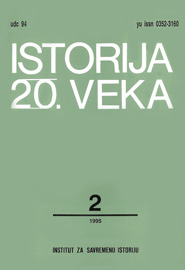VERSKI LIBERALIZAM I POLITlČKA AKTIVNOST SRPSKE PRAVOSLAVNE CRKVE U KRALJEVINI JUGOSLAVIJI
RELIGIOUS LIBERALISM AND POLITICAL ACTIVITY OF THE SERBIAN ORTHODOX CHURCH IN THE KINGDOM OF YUGOSLAVIA
Author(s): Nikola ŽutićSubject(s): History of Church(es), Political history, Recent History (1900 till today), Politics and religion, Pre-WW I & WW I (1900 -1919), Interwar Period (1920 - 1939), WW II and following years (1940 - 1949), Eastern Orthodoxy
Published by: Institut za savremenu istoriju, Beograd
Keywords: Kingdom of Yugoslavia; religion; religious liberalism; Orthodox church; political activity;
Summary/Abstract: In keeping with the existent relations between Serbia and Yugoslavia and the countries of bourgeois liberalism, the so-called »western democracies«, the Serbian Orthodox Church also developed ties with the churches of these countries. As a result the Serbian Orthodox Church was marked by religious liberalism (religious tolerance, patriotic feelings for the fatherland etc.). Religious liberalism turned the activity of the Serbian Orthodox Church toward close co-operation with Protestant and Catholic churches of democratic countries. A particularly close tie was formed with the Anglican Church and plans were made for the dogmatic and liturgical union of the two churches. The Serbian Orthodox Church was until 1937 a constitutional religious organization, which supported the official Francophile course and the Yugoslav national ideology of King Alexander. The Church demonstrated its support by applauding the Yugoslav regime based on ideas of bourgeois liberalism and Yugoslav nationalism. During the tutelary reign of Prince Pavle, the Church’s loyalty was lost due to changes in the country's domestic and foreign politics. The drawing away from France and Great Britain of Yugoslavia, especially after 1937, also led to a gradual withdrawal from positions of authority in the country of people who believed in the unity of Yugoslavia. The inclination of the tutelary regime to create closer ties with Italy, Germany and the Vatican provoked a marked opposition in the Serbian Orthodox Church. The growing favor shown the Roman-Catholic church by Yugoslavia led in 1937 to the crisis of the concord, resulting in serious conflicts and incidents. The Serbian Orthodox Church will have an important part in the »liberals« coup d’etat« by joining the efforts of West-oriented Yugoslav officers, liberal political parties (especially the Agricultural Party) and organization^, such as the Falcons, National Defence etc. in preparing and carrying out) the coup d’etat od 27 March 1941.
Journal: Istorija 20. veka
- Issue Year: 1995
- Issue No: 2
- Page Range: 51-62
- Page Count: 12
- Language: Serbian

